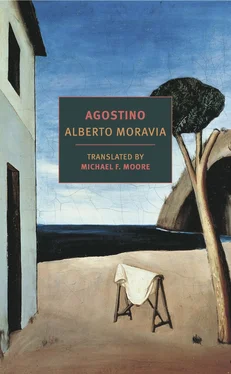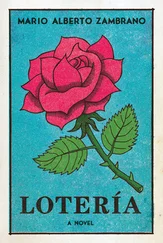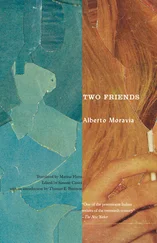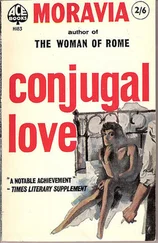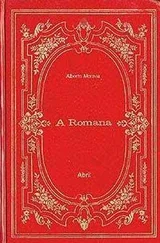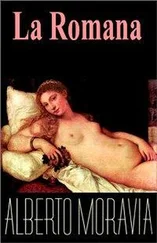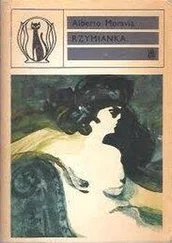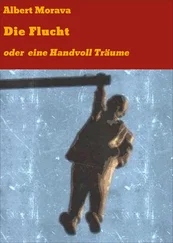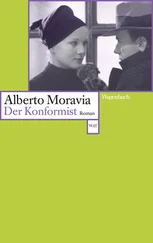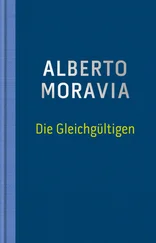“We’re playing cops and robbers,” the boy said a few seconds later, facing Agostino. “I don’t want them to see me.”
“Which one are you?” asked Agostino, quickly drying his tears.
“A robber, of course,” the boy replied without looking at him.
Agostino took a good look at the boy. He didn’t know whether he liked him, but he spoke in a rough dialect that was new to Agostino and sparked his curiosity. Besides which, he sensed instinctively that the boy hiding in the cabin represented an opportunity — what kind of opportunity he couldn’t say — and he shouldn’t let it slip away.
“Can I play, too?” he asked boldly.
The other boy turned and gave him an insolent look. “Who do you think you are?” he said quickly. “We only let our friends play.”
“So,” Agostino said with a shameful insistence, “let me play, too.”
The boy shrugged his shoulders saying, “It’s too late now, the game’s almost over.”
“So let me play the next time.”
“There isn’t going to be a next time,” the boy said, skeptical and almost amazed at such insistence. “After this we’re going to the pine grove.”
“If you’ll take me I can come, too.”
The boy started laughing, both amused and contemptuous. “Get a load of you. Forget about it, we don’t want you.”
Agostino had never found himself in such a situation, but the same instinct that prompted him to ask the boy if he could play was now making him beg for acceptance. “Listen,” he said hesitatingly, “if… if you let me join your group, I’ll give you something.”
The other boy turned around immediately, his eyes alive with greed.
“Whatcha got?”
“Anything you want.”
“Tell me everything you’re gonna give me.”
Agostino pointed to a big toy sailboat, with all its sails still attached, lying at the other end of the cabin surrounded by odds and ends.
“I’ll give you that boat.”
“What am I supposed to do with it?” said the boy, shrugging his shoulders.
“You can sell it,” Agostino proposed.
“They won’t take it from me,” the boy said with an experienced air. “They’d say it was stolen.”
Despairing, Agostino took a look around. His mother’s clothes were hanging from a wall hook. Her shoes were on the floor, and on a side table a kerchief and a few other objects. There seemed to be nothing in the cabin he could offer.
“Hey,” said the boy, noticing his bewilderment. “You got any cigarettes?”
Agostino remembered how that morning his mother had put two packs of very fine cigarettes in the large bag hanging from a wall hook. Triumphant, he was quick to answer. “Of course, yes, cigarettes I do have. Do you want them?”
“You have to ask?” said the boy with an ironic sneer. “You’re such a dope. Give ’em here, quick.”
Agostino unhooked the bag from the coatrack, rummaged around inside it, and pulled out the two packs. He showed them to the boy as if he couldn’t tell how many cigarettes he wanted.
“Gimme both,” the boy said offhandedly, snatching both packs from him. He checked the brand name, clucked his tongue in appreciation, and added, “Say, you must be rich.”
Agostino didn’t know what to answer. The boy continued. “I’m Berto. Who are you?”
Agostino said his name, but the boy had already stopped listening. Breaking the paper seal and opening one of the packs with impatient fingers, he took out a cigarette and brought it to his lips. Then he took a kitchen match from his pocket, scratched it against the cabin wall to light it, and, after a first puff of smoke, took another cautious peek out the door.
“Come on, we’re going,” he said after a moment, gesturing to Agostino to follow him. One after the other, they stepped out of the cabin.
On the beach, Berto immediately headed for the road behind the row of cabins.
Walking across the scorching sand, through a thicket of juniper and thistle bushes, he said, “Now we’re going to the den. The other guys have left by now and are looking for me up that way.”
“Where’s the den?” Agostino asked.
“By the Vespucci beach stand.” He held the cigarette vainly, as if to flaunt it, and with a rugged sensuality took a long drag. “You don’t smoke?” he asked Agostino.
“I don’t much care for it,” Agostino answered. He was too ashamed to admit that the idea had never occurred to him.
But Berto laughed. “Fess up, you don’t smoke because your mom won’t let you.” He said these words in an unkind, even disdainful manner. He held out the cigarette to Agostino and said, “Come on, give it a try.”
They had reached the promenade and were walking barefoot on the sharp gravel between the dried-up flower beds. Agostino brought the cigarette to his lips and took a tiny puff, immediately coughing it out.
Berto laughed scornfully. “You call that smoking?” he exclaimed. “That’s not how you do it. Here, let me show you.” He took the cigarette and inhaled deeply, rolling his surly, listless blue eyes, then he opened his mouth wide and brought it close to Agostino’s face. His mouth was empty, with the tongue curling at the back of his palate.
“Get a good look,” Berto said, closing his mouth. He blew a cloud of smoke right into Agostino’s face. Agostino coughed and giggled in panic. “Now you try,” Berto added.
A streetcar passed by, whistling, shaking its curtains in the wind. Agostino took another big puff and with a painful effort inhaled the smoke. But it went down the wrong way and he started coughing quite pathetically. Berto took the cigarette and giving him a pat on the back said, “Good boy… I can see you’re a big smoker.”
After this experiment they walked along in silence. One bathing establishment followed the other, with their rows of cabins painted in pastel colors, tilted beach umbrellas, and idiotic triumphal arches. In between the cabins you could see the crowded beach and hear the festive buzzing. The sparkling sea was filled with bathers.
“Where is Vespucci beach?” Agostino asked, quickening his pace to keep up with his new friend.
“It’s the last one.”
Agostino wondered whether he shouldn’t turn back: If his mother hadn’t gone out on the boat, she would surely be looking for him. But the memory of that slap stifled this last scruple. He felt as if, by going off with Berto, he were pursuing an obscure and justified form of revenge. “What about smoke in your nose?” Berto suddenly asked him. “Do you know how to exhale through your nostrils?”
Agostino shook his head. With the cigarette butt stuck between his lips, Berto inhaled the smoke and blew it out through his nostrils. “Watch me,” he added, “I’m going to make the smoke come out of my eyes. Now put your hand on my chest and look me in the eyes.” Unsuspecting, Agostino approached him, placed his palm over the boy’s chest, and stared at his pupils, waiting to see if smoke really would come out. But the boy tricked him by suddenly stubbing out the lit cigarette on the back of Agostino’s hand and jumped for joy as he tossed away the butt, shouting, “You fell for it. What a dope… what a dope!”
The pain was blinding, and Agostino’s first impulse was to throw himself at Berto and start punching him. But the other boy, seeing him run toward him, stood still, placed his fists against Agostino’s chest, and with two hard blows to his stomach, almost knocked him out and left him gasping for air. “You want to make something of it?” he said maliciously. “There’s more where that came from.” Furious, Agostino charged him again, but he felt weak and destined to lose. This time Berto grabbed him, stuck his head under his arm, and started to choke Agostino, who had stopped struggling and was begging Berto in a strangled voice to let him go. Berto released him and, with a backward jump, landed on both feet in combat position. But Agostino had heard the vertebrae of his neck crackle. He was not so much frightened as bewildered by the boy’s extraordinary brutality. It seemed incredible that he, Agostino, whom everyone had always liked, could now be hurt so deliberately and ruthlessly. Most of all he was bewildered and troubled by this ruthlessness, a new behavior so monstrous it was almost attractive.
Читать дальше
